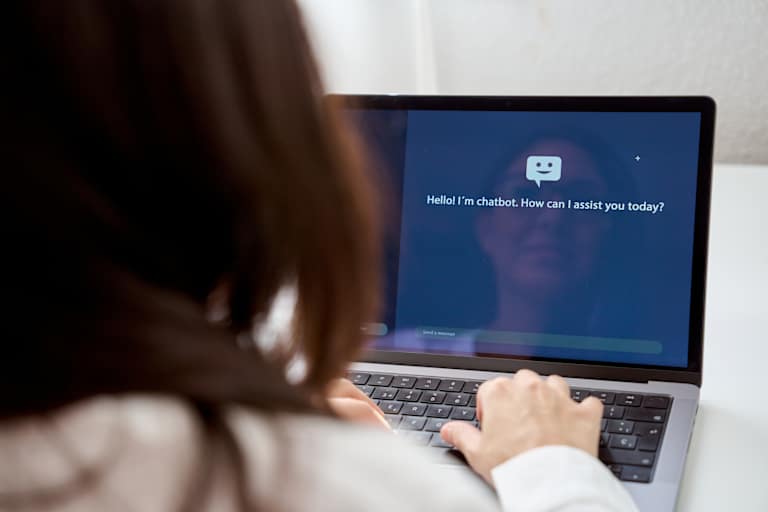Is Psychology an AI-Safe Field? Experts Weigh In and Give This Advice to Students
- Experts agree that AI cannot replace psychologists and licensed mental health providers.
- However, the rise of therapy chatbots and other AI tools will change psychology and the mental health field.
- Experts encourage psychology students to understand the applications of AI in the field and the potential downsides.
Artificial intelligence has already disrupted the workforce, and its impact will continue for decades.
Many AI experts think AI will mean fewer jobs for cashiers, truck drivers, journalists, and factory workers over the next 20 years, according to a 2025 Pew Research survey. While mental health therapists rank among the jobs least at risk due to AI, there are still concerns about the growing popularity of AI-powered chatbots being used for mental health support.
So what does the rise of AI mean for psychology students? Psychology.org asked psychologists, therapists, and professors to share their thoughts, and a common sentiment was clear: the era of AI offers opportunities — and warnings. An awareness of AI’s power and limits can give students an edge in the future workforce.
“Psychology has been at the heart of AI since the beginning,” said Carolyn Karoll, a licensed psychotherapist. “Understanding these tools now can help students think critically about how to use them responsibly in the future.”
Meet Our Contributors
- Keith Dewey is a psychologist, neurologist, and technologist who is currently researching the emergent use of AI in psychology as part of an MSc Psychology and Neuroscience for Mental Health program at King’s College London.
- Katherine Hertlein, Ph.D., LMFT,is an AAMFT Member and licensed family therapist, and the Associate Dean of Faculty Affairs at Boonshoft School of Medicine.
- Carolyn Karoll, LCSW-C, CEDS-S, is a licensed psychotherapist and certified eating disorder specialist.
- K. Jake Patten, Ph.D., is a cognitive psychologist who graduated with a Ph.D. in psychology from Arizona State University. Patten is currently an associate teaching professor at ASU’s College of Health Solutions.
Understanding AI and Its Relationship to Psychology
Psychology is the science of the mind. Not surprisingly, psychologists have played a significant role in shaping AI for decades.
“Cognitive psychology has inspired core AI concepts, including reasoning, memory, and problem-solving,” said Karoll. “Even neural networks were modeled after the human brain.”
Developed in the mid-20th century, psychological models for how the brain learns shaped approaches to machine learning. Psychological research into intelligence from the 1980s sparked the development of artificial neural networks and large language models.
Many AI leaders have a background in psychology. For example, cognitive psychologist Geoffrey Hinton received the 2024 Nobel Prize for Physics for his research on artificial neural networks. Known as the “Godfather of AI,” Hinton majored in psychology and applied psychological models to machine learning.
“AI is our attempt to replicate how humans think and make decisions,” said Karoll. With their knowledge of the mind and decision-making, psychology students are thus well-positioned to understand how AI will change society.
AI’s Impact On the Practice of Psychology and Mental Health
In 2023, the American Psychological Association (APA) warned that “AI is changing every aspect of psychology.” So, how is AI transforming psychology and the mental health field?
On the positive side, AI can streamline administrative tasks. “AI tools are helping therapists with session notes, scheduling, symptom tracking, and even drafting treatment plans,” said Karoll. “These tools save time and allow therapists to focus more on patient care.”
Similarly, psychologist Keith Dewey has researched the use of AI in psychology and sees several applications of AI in mental health practice. AI can help psychologists in “learning new therapy techniques, developing ideas for working with clients, transcribing and summarizing meetings, and more.”
The neuroscientific research community has leveraged the data analytical power of AI. “These models are already facilitating earlier detection, better recovery rates, and even potential prevention opportunities,” Dewey said.
However, even in these applications, AI poses challenges for mental health providers. “All AI systems have the potential for error,” Dewey noted.
That can be particularly troubling when people turn to AI chatbots rather than licensed mental health providers.
“Whether therapists choose to engage in using it is one question,” said Dr. Katherine Hertlein, LMFT, “but we must realize that our clients are using it – whether they tell us or not – and their searches, queries, and musings have an impact on our profession.”
The Growing Popularity of Chatbot Therapy
Chatbot therapy promises to revolutionize mental healthcare. Today, 1 in 3 people in the U.S. lives in areas with a shortage of mental health providers. Chatbots can make therapy more accessible and convenient.
“Therapy bots have the potential to significantly reduce costs and improve availability,” said Dewey. In a 2024 Gallup poll, 52% of respondents pointed to affordability as the top barrier for mental healthcare, while 42% reported challenges finding a provider.
“Chatbots can make mental health support more accessible,” Karoll said. “They’re anonymous, always available, and helpful for psychoeducation, mood tracking, or even journaling prompts between sessions. For people with mild symptoms or those hesitant to see a therapist, they can act as a first step toward care.”
In a 2024 YouGov poll, 1 in 3 respondents said they were comfortable sharing mental health issues with an AI chatbot. However, nearly half are worried about privacy and data safety, which is a particularly important issue when people share personal information with therapy chatbots.
Mental health providers may increasingly find themselves in conflict with chatbot advice. As Hertlein said, “I have certainly had people in my practice who have sought the guidance of AI and found it difficult to reconcile when there were differences in what AI produced versus what I said.”
The Potential for Harm with Chatbot Therapy
Experts agree that therapy chatbots “can’t replace real therapy,” as Karoll put it. And people who turn to chatbots to address mental health issues may not be aware of the technology’s limitations.
“Chatbots often miss nuance, can’t read body language, and may give harmful advice,” said Karoll. The YouGov poll also found that 40% of respondents feared the potential for misdiagnosis, while 36% worried about inaccurate advice.
In addition to the risk that chatbots may provide harmful advice, their use could also delay people in crisis from seeking professional support.
In February 2025, APA advocated for federal regulation of mental health chatbots, warning of the danger of chatbots encouraging users to engage in harmful practices.
“We want consumers to know the risks when they use chatbots for mental and behavioral health that were not created for that purpose,” said Dr. Vaile Wright, APA’s senior director of health care innovation.
Licensed mental health professionals will play an important role in protecting the health and safety of those seeking support. “These systems work best with human oversight,” said Karoll. “They’re helpers, not replacements.”
Should Students In the Mental Healthcare Field Be Concerned?
Psychology is one of the most popular college majors, with nearly 130,000 psychology bachelor’s degrees awarded in 2022, according to the National Center for Education Statistics. And its popularity continues to grow, with the number of psych majors increasing 19% from 2012 to 2022.
The rise of AI may mean fewer jobs in certain fields. The Pew Research survey found that 52% of workers are worried about AI in the workplace, with 32% fearing they will personally experience fewer job opportunities because of AI.
Should college students studying psychology and related fields reconsider their major?
AI will not replace therapists, said Karoll. “Therapy is about human connection, including attunement, intuition, and sitting with someone’s pain in real-time. Those qualities can’t be programmed. AI may change how we work, but it won’t replace what we do.”
While AI may speed up administrative tasks, it cannot replace the clinical expertise of mental health providers.
Counseling, social work, and other care economy jobs are “expected to grow significantly over the next five years,” according to the World Economic Forum’s 2025 Future of Jobs Report.
Similarly, research-focused roles may benefit from the analytical power of AI without a negative impact on job prospects. “Research in the social sciences depends on developing novel ideas and collecting data from real participants,” said Dr. K. Jake Patten, a psychology professor at Arizona State University. “AI might be helpful in some of these tasks but cannot replace the researcher.”
Embracing the Application of AI in Psychology
Psychology, counseling, and social work students can leverage the power of AI without competing with AI. How can students embrace AI technology? The process starts with understanding the technology and its applications.
“Be curious about where psychology meets technology,” recommended Karoll. “This might involve getting involved in research on mental health apps, interning with companies that develop digital therapy tools, or observing how AI is being used in clinical settings to support, rather than replace, therapists.”
Across many industries, AI will change how professionals operate. Psychology students can turn AI into an opportunity rather than a threat, Karoll said. “They can help shape how technology is used in ways that support, not overshadow, the human element.”
In addition, AI can help mental health providers achieve a critical goal: reaching the millions of people who struggle to access mental healthcare. With the right safety and privacy protections in place, AI-powered mental health tools could prove transformative.
“There are many productive uses for AI in therapy provided that it is used in ethical and appropriate ways,” Hertlein argued. “For example, prospective students can lean into the features of speed, remote patient monitoring, and considerations for interventions in ways that support their work rather than compete with it.”
Using AI tools to optimize administrative tasks can also free up time for patient care. Because while AI can imitate human patterns, it cannot replace them.
“See AI as a tool, not competition,” Karoll recommended. “Focus on building strong clinical skills such as self-awareness, emotional intelligence, and ethical decision-making, which no algorithm can replicate.”





